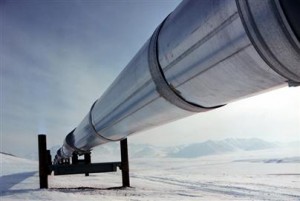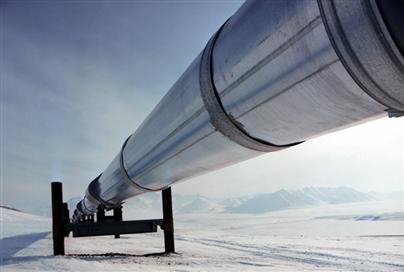
KARACHI - Iranian President Mahmud Ahmadinejad has vowed to complete the Iran-Pakistan (IP) gas pipeline project by 2014 despite United States opposition. Ahmadinejad, who attended the summit of the Developing-8 (D-8) countries held in Islamabad last week, told a press conference in Islamabad that Iran was extending financial assistance to Pakistan to help towards completion of the project.
He pledged a US$500 million loan to Islamabad for laying the portion of the pipeline inside Pakistani territory, which is estimated to cost $1.5 billion. Tehran has however sought assurance from Islamabad that it will not back out under US�pressure and that it will complete the project on time.
Last week, the Iranian president attended the eighth summit of D-8 countries - Pakistan, Turkey, Malaysia, Iran, Bangladesh, Indonesia, Nigeria and Egypt - which aims at enhancing trade and cooperation between the member states.
Ahmadinejad downplayed the financial constraints and US pressure on Islamabad to scrap the IP deal, and vowed to complete the pipeline project within the scheduled timeframe. The pipeline is projected to start supplying 750 million cubic feet of gas per day (MMCFD) starting from December 2014.
"America cannot affect this project ... God willing, this project will be completed soon and gas will reach Pakistan," AFP reported Ahmadinejad as saying at a press conference in Islamabad. "The portion of pipeline on [the] Iranian side is about to be completed swiftly, while on [the] Pakistan side the work will be completed soon."
Pakistan has so far failed to arrange the fund required to lay the pipeline, either from any country or international donor agency, due to international sanctions imposed on Iran. Iran has agreed to provide $500 million for the project, with $250 million provided by Iran on a government-to-government basis and the remaining $250 million to be arranged by Iranian commercial banks.
"We have assured the Iranian president that the funds will be utilized for construction of the gas pipeline in Pakistan and it will be completed in time," The Express Tribune reported official sources as saying. "Now all issues have been settled to move ahead on the project."
Pakistan plans to arrange the remaining amount of the IP project through collection of a gas infrastructure development cess, or tax, levied on domestic gas consumers. Pakistani authorities are confident of collecting 30 billion rupees (US$312 million) of cess from gas consumers in the current fiscal year, which ends next June. Germany-based firm ILF has completed the engineering design of the pipeline in Pakistani territory.
Islamabad and Tehran have also decided to lay the pipeline using Pakistani and Iranian gas companies because foreign companies have lost interest in any Iranian project amid sanctions pressure from the US, which has warned foreign firms of possible sanctions if they participate in the project. A Chinese bank backed off from financing the pipeline project in March amid pressure from the Washington. If the pipeline is completed, India and/or China might join at the project at a later stage.
The IP pipeline has the potential of being an energy lifeline for Pakistan, which suffers chronic gas shortages that affected industry and daily life. The government has warned that the country's whole energy system faces collapse, as the gap between demand (at 6 billion cubic feet) and supply (3.8 bcf) now amounts to 2.2 bcf.
The IP pipeline project would help generate around 5,000 megawatts of electricity, almost equivalent to the present peak power shortage.
The US embassy and US aid agency USAID have sought to convince the Pakistani authorities to shelve the pipeline project, offering financial and technical assistance to materialize a plan to import liquefied natural gas (LNG) from Qatar and construction of the Bhasha dam to help address the country's energy woes.
Pakistan and Qatar in February signed a Memorandum of Understanding for importing to Pakistan 3.5 million tons per annum of LNG. Qatar has authorized US energy giant ConocoPhillips, which has a stake in the North Field (aka North Dome) gas project along the Qatar-Iran border, to finalize the LNG plan. The US company and Pakistan's state-run gas distributor Sui Southern Gas Co (SSGC) are reportedly close to signing an agreement.
"ConocoPhillips has submitted a draft of the MoU to SSGC, which is being reviewed by the gas utility," The Express Tribune reported, citing unnamed official source. Senior Pakistani officials "have held several meetings with the representatives of ConocoPhillips in Dubai and England, aimed at clinching a deal. The company has refused to export LNG through middlemen and wants to strike a direct deal with a state-run enterprise like SSGC."
The Asian Development Bank (ADB) has refused to finance the $13 billion Bhasha dam project in the country's north, but the US has pledged to play a role in generating funds for the dam's construction by becoming part of a consortium, led by the ADB. Washington has committed to provide $200 million for the project.
Last month, the US reaffirmed at a meeting between US embassy officials and Federal Water and Power Minister Ahmed Mukhtar in Islamabad its pledge to help construct the dam. The three-member US team led by US Counselor for Economic Assistance and Development Richard Albright also suggested that Mukhtar securitize assets of different dams, including Tarbela and Mangla, in order to seek funds from international donors for Bhasha dam.
The World Bank has asked Pakistan to seek a no-objection certificate from India for the construction of dam in Gilgit Baltistan region, which is the part of the larger Jammu and Kashmir dispute between the two countries, while the ADB has linked its funding for the dam project with the much-needed reforms in Pakistan's power sector.
Local analysts, however, believe that though the US commitment to financing the Bhasha dam may help the country to persuade institutions like the World Bank to become financing partners in the project, US participation would be linked to Islamabad backing away from the IP pipeline.
Security is also a key issue facing construction and running of the pipeline, as it will cross the restive Balochistan province. Talibanization is growing in several areas of the province and security forces might be patronizing militants, turning Quetta into a haven for militants, according to a recent report of the Human Right Commission of Pakistan. It stated that militants have managed to establish training camps in the province.
The report says the government and security agencies have completely failed to deal with militants, insurgents, and other criminal elements. NGO workers fear abduction, and development agencies have abandoned the troubled area.
The Iran Project is not responsible for the content of quoted articles.











